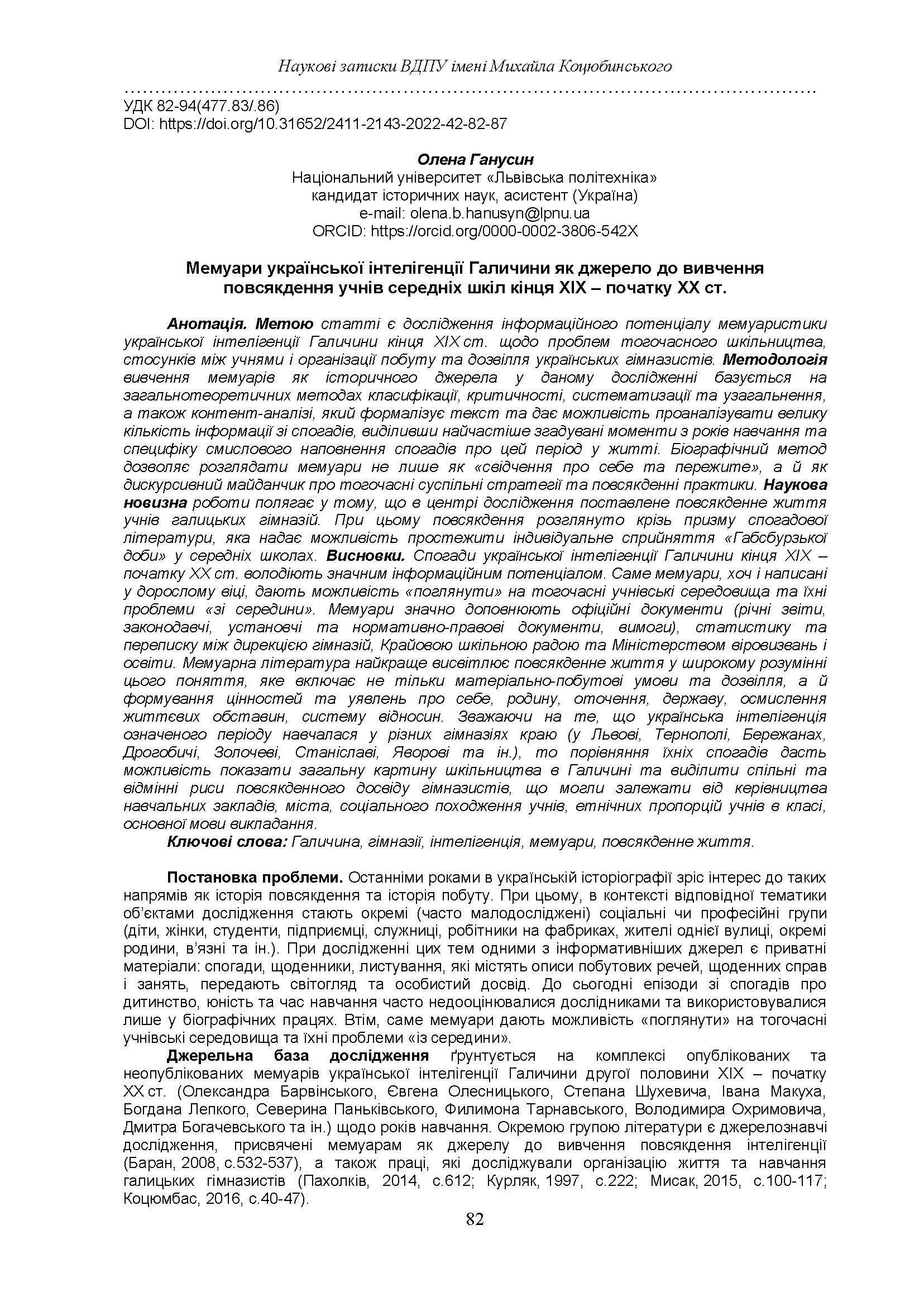Abstract
The purpose of the article is to study the research and information potential of the memoiristics of the Ukrainian intelligentsia of Galicia in the late nineteenth century on the problems of the contemporary schooling, relations between students and the organization of life and leisure of Ukrainian high school students. The methodology for studying memoirs as a historical source in this study is based on general theoretical methods of classification, criticality, systematization and generalization, as well as content analysis, which formalizes the text and makes it possible to analyze a large amount of information from memories, highlighting the most frequently mentioned moments from the years of study and the specifics of the semantic content of memories of this period in life. The biographical method allows us to consider memoirs not only as "testimony of oneself and experienced", but also as a discursive platform about contemporary social strategies and everyday practices. The scientific novelty of the work lies in the fact that the daily life of students of Galician gymnasiums is put at the center of the study. Moreover, everyday life is viewed through the prism of memoir literature, which provides an opportunity to trace the individual perception of the "Habsburg era" in secondary schools. Conclusions. Memoirs of the Ukrainian intelligentsia of Galicia of the late XIX - early XX centuries. have significant information potential. It is the memoirs, although written in adulthood, that provide an opportunity to "look" at the student environments of that time and their problems "from the inside". Memoirs significantly complement official documents (annual reports, legislative, constituent and regulatory documents, requirements), statistics and correspondence between the directorate of gymnasiums, the Regional School Council and the Ministry of Creeds and Education. Memoir literature best covers everyday life in a broad understanding of this concept, which includes not only material and living conditions and leisure, but also the formation of values and ideas about oneself, family, environment, state, comprehension of life circumstances, system of relations. Taking into account the fact that Ukrainian intelligentsia of this period studied in different gymnasiums of the region (in Lviv, Ternopil, Berezhany, Drohobych, Zolochiv, Stanislav, etc.), a comparison of their memories will make it possible to show the overall picture of schooling in Galicia and highlight the common and distinctive features of the daily experience of high school students, which could depend on the leadership of educational institutions, the city, the social origin of students, the ethnic proportions of students in the classroom, the main language of instruction.
References
Барвінський, О. (2004). Спомини з мого життя. Частина перша та друга. Нью-Йорк, Київ. 528 с.
Бережанська гімназія. (2007). Бережанська гімназія. Сторінки історії. Ювілейна книга. Бережани–Тернопіль. 1028 с.
Билина, І. (1928). Моя сповідь (Зі споминів інтелігента сільського походження). Тернопіль.
Зварич, П. (1976). Спомини (1877–1904). Вінніпеґ. 240 с.
Коцюмбас, О. (2016). Академічна гімназія у Львові: учнівський склад другої половини ХІХ – ХХ ст. Вісник Львівського торговельно-економічного університету (Гуманітарні науки). Вип. 14. С. 40–47.
Крипʼякевич, І. (2001). Спогади (Автобіографія). Іван Крипʼякевич у родинній традиції, науці, суспільстві. (Україна: культурна спадщина, національна свідомість, державність. Збірник наукових праць. Вип. 8. C. 77–140.
Курляк, І. (1997). Українська гімназійна освіта у Галичині (1864–1918). Львів. 222 с.
Лепкий, Б. (2016). Казка мойого життя. Тернопіль. 416 с.
ЛННБ – Львівська національна наукова бібліотека України імені Василя Стефаника. Відділ рукописів.
Любовець, Н. (2010). Вивчення мемуарів як історичного джерела: до історіографії проблеми. Українська біографістика. Київ. Вип. 7. С. 66-104.
Макух, І. (2001). На народній службі. Спогади. Київ. 572 с.
Мисак, Н. (2015). Середня освіта як важливий чинник у формуванні української інтелігенції в Галичині наприкінці ХІХ — на початку ХХ століття. Україна–Польща: історична спадщина і суспільна свідомість. Вип. 8. С. 100–117.
Олесницький, Є. (2011). Сторінки з мого життя Львів. 432 с.
Олена Степанів – Роман Дашкевич. (2009). Спогади і нариси. Львів. 632 с.
Пахолків, С. (2014). Українська інтелігенція у Габсбурзькій Галичині: освічена верства й емансипація нації. Львів. 612 с.
Слиж, А. (2014). «Мої літа». Спогади. Львів. 156 с.
Смаль-Стоцький, С. (2013). Немолів (Спомини). Львів. 72 с.
Спомыны. Спомыны зъ студентських лѣтъ. (1897). Діло. Ч. 101.
Тарнавський, Ф. (1981). Спогади. Родинна хроніка Тарнавських як причинок до історії церковних, священицьких, побутових, економічних і політичних відносин у Галичині в другій половині ХІХ сторіччя і першій декаді ХХ сторіччя. Торонто. 267 с.
ЦДІАЛ - Центральний державний історичний архів у м. Львові.
Шах, С. (2006). Львів – місто моєї молодости. Спомини присвячений Тіням забутих Львов’ян. Частина І і ІІ. Львів. 208 с.
Шах, С. (2010) Львів – місто моєї молодости. Цісарсько-Королівська Академічна Гімназія. Львів. 240 с.
Ювілейна книга (1998). Ювілейна книга української гімназії в Тернополі 1898-1998. До сторіччя заснування. Тернопіль-Львів, 1998. 731 с.

This work is licensed under a Creative Commons Attribution 4.0 International License.
Copyright (c) 2023 Олена Ганусин





